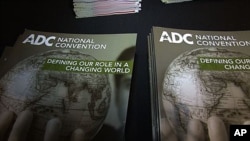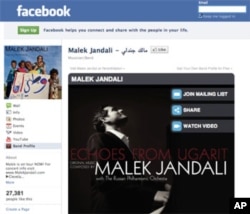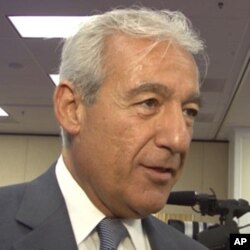“Oh my homeland, when will I see you free… When the land is watered with the blood of martyrs and the brave… And all the people shout: Freedom to mankind."
Imagine writing these song lyrics because you felt compelled to do something to address the injustice of a brutal crackdown plaguing your home country. Imagine being invited by one of the oldest Arab American civic organizations to perform at its annual national convention in Washington, D.C. Now imagine being disinvited by the same organization… because you planned to perform your protest song.
That’s exactly what happened to Malek Jandali this week at the American-Arab Anti-discrimination Committee’s National Convention. ADC’s sudden dis-invitation of Jandali has exposed a rift in the Arab American community and sparked a debate as to what degree Arab American’s should embrace the Arab Spring. Furthermore, the Jandali case has prompted strident calls for a change of leadership at the ADC for its purported ties to the regime of Syria’s autocratic President Bashar al-Assad.
The "Watani Ana" controversy
Jandali is a renowned German-born Syrian pianist and songwriter, known best for contemporizing some the oldest songs ever written – ancient Syrian Ugarit melodies that date back as far as 3400 B.C. Recently, he penned “Watani Ana,” or “I Am My Homeland,” after being moved by pro-democracy protests and subsequent violent military reprisals taking place across Syria.
The decision to prevent Jandali from performing caused an uproar in the Arab American community, social media circles like Facebook and Twitter and especially, at the ADC convention itself. Many speakers cancelled at the last minute, refusing to appear as a sign of protest. Others speakers made their feelings known on stage.
In defiance of the decision, Libyan-born poet Khaled Mattawa recited lyrics from “Watani Ana” at the beginning of his panel discussion on popular uprisings in the Arab world. He called ADC’s decision was a “travesty” and said he almost didn’t attend.
Watch some convention participants react to the Jandali controversy:
A case for freedom of expression
Dean Obeidallah is an Arab American comedian who has appeared on Al Jazeera English’s "The Stream" and Comedy Central’s “Axis of Evil” special. He was invited to speak on a panel called “Social Networking in a Changing Media.” He, too, used the opportunity to draw attention to the Jandali case and the issue of freedom of expression.
“I’m very much against the decision. I’m a comedian, a performer, and freedom of expression is fundamental to my career,” said Obediallah. “As I told the audience today, if there are people uncomfortable with the fact that [Jandali] was going to talk about freedom for the Syrian people, for the Arab people, you don’t disinvite the singer. Disinvite the people uncomfortable with freedom for Arabs.”
A miscommunication?
In an interview with VOA, ADC Chairman Safa Rifka said, technically, there was no “dis-invitation” and Jandali’s failure to appear stemmed from a “miscommunication” between ADC and Jandali’s agent – a contradiction to what Jandali posted on his own Facebook page.
“I think that the Arab American community wishes the Middle East stability and democracy.” Rifka added. “Of course, we are all saddened for the loss of life that is happening there. But at the same time the Arab American community has challenges of their own.”
One of those challenges, in the case of ADC, appears to be projecting greater transparency in a world where social media spreads controversy quickly. As the conference began, blogs about the Jandali decision were posted on Politico, Huffington Post and several English-language newspapers in the Middle East. Even the Arab American Institute issued a statement condemning the decision, urging ADC to make amends with its members.
On Saturday, irate ADC members won a partial victory as ADC organizers acquiesced and played Jandali’s song during a reception, although he himself was not in attendance.
The possible cause
But another deeper challenge is the perception of a possible conflict of interest, specifically in regards to where ADC gets its funding. The conference program lists the Saudi Arabian Embassy as a main sponsor. Other Arab regimes that are listed in the sponsors section of the ADC Convention program include Syria, Bahrain and Morocco.
In the program, readers will also find a letter from Imad Moustapha, Syrian Ambassador to the United States. Politico’s Ben Smith asserted that the real reason Jandali was told not to come was because Rifka and Moustapha are personal friends, and Rifka did not want to offend the Syrian regime of Bashar al-Assad, which is widely deemed responsible for a brutal crackdown against its own people. In his own blog, Imad Moustapha lists Safa Rifka as one of his best friends.
“The ADC itself has been run to the ground by its own despot, Mr. Safa Rifka, and taken an alliance with the oppressive Syrian regime,” Fadi Kiblawi, a long-time ADC member and Washington, D.C.-based lawyer told VOA. “We’re disappointed and want the removal of Safa Rifka as chairman.”
As Arab American consciousness about the Arab Spring revolutions continues to grow, many Arab Americans expect organizations like ADC to stand firm in their commitment to anti-discrimination, support freedom of expression and reconsider accepting funds from regimes that are on the record for suppressing their own citizens. The Malek Jandali case has brought the issue into sharper focus.
“We need ADC and try to make sure these things never happen again,” said comedian Obeidallah. “This organization should be one that stands absolutely for freedoms and for civil rights - for Arab Americans here, and standing firmly with the people in the Arab world and their freedom. I’m hopeful this is actually a teaching moment, a turning point, one that’ll lead to something better for ADC in the future.”
Additional reporting by Hina Samnani and Lolla Mohammed Nur.
Watch a rendition of Malek Jandali's "Watani Ana."
Watch our iPhone QuickTake of Comedian Dean Obeidallah:











